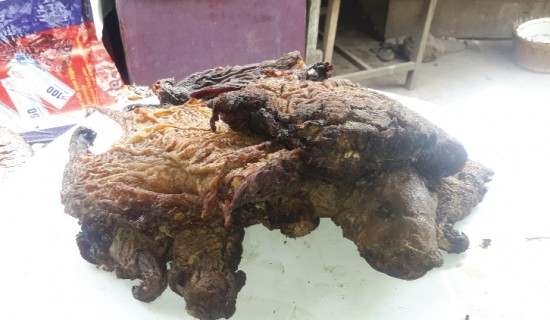As a result, the sale of bush meat, which used to be a booming business, is not flourishing.
According to media reports, some traders in bush meat in Nigeria, Benin and Cote d’Ivoire have already closed down their shops, following the outbreak of the disease in some parts of Africa.
Sales drop
A visit to the Mallam Atta and the Adabraka markets and some ‘chop bars’ in Accra indicated that the sale and patronage of bush meat, especially grasscutter, have reduced drastically.
At the Mallam Atta Market, for instance, only a few of the bush meat sellers were doing business.
Ms Mabel Marku, a student who was spotted selling bush meat, indicated that “the market has deteriorated and is gradually collapsing. The Ebola alert has scared people from consuming bush meat”.
She explained that before the scare, she could make sales of between GH¢400 and GH¢500 over the weekend, but since the scare, sales had dropped to GH¢40.
Another bush meat trader at the Adabraka Market, Madam Grace Anyomi, who claimed to have been in the business for the past 40 years, debunked the speculation that the Ebola virus was in bush meat, saying that “bush meat is healthier than any meat because it has no fat”.
“Our business is collapsing. I have used income from this business to take care of all my children for all these years. So where and when did this virus get into it? For me, I do not believe that there is any virus in it and I will continue to do my business,” she said.
According to another trader, Madam Abena Tekpetey, researchers should research into the speculations and come up with the evidence that, indeed, one could contract the disease after consuming bush meat.
Quantities of soup reduced
During a visit to some chop bars, it was observed that the quantities of bush meat soup had reduced, while some operators had stopped preparing them altogether.
At the Top Taste Restaurant at Kokomlemle, Madam Adwoa Owusu Ansah, the operator, said she prepared bush meat soup but had reduced the quantity because patronage was very low.
“Even with the small quantity that I prepare, patronage is very low because it takes a longer time for it to be bought. But the situation was different some months ago,” she said.
At Auntie Grace Special at Adabraka, the operator, Madam Grace Asamoah, indicated that the business had virtually collapsed.
She explained that before the Ebola scare, she could sell about four full grasscutters in a day, but since last week the full grasscutter she prepared for sale was still not finished.
“I have made up my mind to stop the grasscutter soup, which used to be one of my main soups and customers’ favourite,” she said.
Lovers of bush meat
Some regular consumers of bush meat expressed mixed feelings in separate interviews with the Daily Graphic.
“I have stopped patronising bush meat because my mother for whom I used to prepare it is now scared to take it,” Ms Rose Ama Donkor, a trader, said.
“I used to be a lover of bush meat, but now I will not even go close to any bush meat because I do not want to be infected,” Nana Yaa Oppong said.
But other consumers said they would not be deterred by the Ebola virus and so they still enjoyed bush meat.
Mrs Rita Appiah, a businesswoman who was spotted buying bush meat, said she would continue to eat it, although her husband had indicated that he would not take it.
Health expert
The Head of the Disease Surveillance Department of the Ghana Health Service, Dr Badu Sarkodie, in an interview, explained that the virus could spread through human-to-human contact.
However, he said people who came into contact with animals such as dead or ill bats, chimpanzees, gorillas, monkeys, antelopes, porcupines, among other wildlife, could be infected.











 (Selorm) |
(Selorm) |  (Nana Kwesi)
(Nana Kwesi)